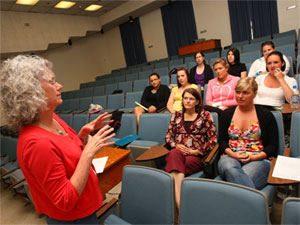 |
| Professor Brenda Sabo with nursing students in the classroom. (Nick Pearce Photo) |
A significant expansion lies ahead for the School of Nursing at Dalhousie, starting this fall with the addition of 30 new seats.
It’s part of Nova Scotia’s strategy to address looming workforce shortages, as a surge of retiring baby boomers and the rapidly aging population combine to create staffing pressures and rising caseloads in the health-care sector.
The provincial government announced a $3.4 million boost in funding today for university and community college nursing programs. An extra $350,000 is earmarked to upgrade facilities at Dalhousie’s Halifax and Yarmouth campuses, as well as Cape Breton University, which receives 16 new seats.
“We welcome this opportunity to join with other institutions in meeting the urgent need for more nurses, and we’re mobilizing quickly to accommodate the influx of new students,” said William Webster, dean of the Faculty of Health Professions.
The new investment means a 20 per cent jump in enrolment for the Bachelor of Science in Nursing (BScN) degree program. Admissions will rise this fall from 135 to 160 seats at the main campus in Halifax, with five more added to the existing 20 at Dal’s site in Yarmouth.
Going into its 60th year, the School of Nursing has a current enrolment of about 600 undergrads and 125 in graduate studies. The expansion will require more classroom and lab teaching spaces, instructors and clinical preceptors. New approaches to teaching are also in the works, such as the expanded use of simulations and further opportunities for interprofessional study.
“It will be challenging, but we are confident that with the support of our partners, we will be able to do it and, most importantly, maintain a high quality of education so our graduates are well prepared for the health workplace of tomorrow,” said Dr. Webster.
Students and faculty expressed some concern about whether the university can line up enough professors and clinical placements, given the short timeline.
“We have very strong partnerships with the hospitals and clinical agencies and that’s important going into an expansion like this,” explained Professor Lucille Wittstock, associate director of Undergraduate Student Affairs. “We all have to work together—and we’re looking at new ways of doing things while we expand.”
Recruitment won’t be a challenge – at least 700 qualified candidates apply to the undergraduate nursing program each year, she said. Applicants are drawn by the national and international reputations of faculty members, and Dal’s wide range of flexible options:
- accelerated degree programs with year-round study;
- part-time and distance education;
- courses that develop specializations in oncology, acute care, palliative care and more;
- graduate-level choices including health policy and nurse practitioner studies;
- advanced clinical placements in a variety of contexts;
- program offerings in Yarmouth, as well as a BScN (Arctic Nursing) program in Iqaluit
- opportunities to study alongside other health care professions, learning team-based approaches that reflect ongoing evolutions in the field;
- the only Nursing PhD program in Atlantic Canada.
In calling for 832 more long-term care beds by the year 2010, the province’s Continuing Care Strategy is a major factor in the nursing school expansions, Health Minister Chris d’Entrement said in his announcement, held at the Nova Scotia Community College on the Dartmouth waterfront.
“This investment will bring us closer to addressing those needs, in combination with significant efforts in recruitment and retention and the development of a new collaborative care model for the health system,” said Mr. d’Entrement.
It also brings Nova Scotia’s total annual budget to $11.4 million for nursing seats. The community college will provide licensed practical nursing training to 180 more students at seven campuses across the province, for a total of 226 new nursing seats this fall.
